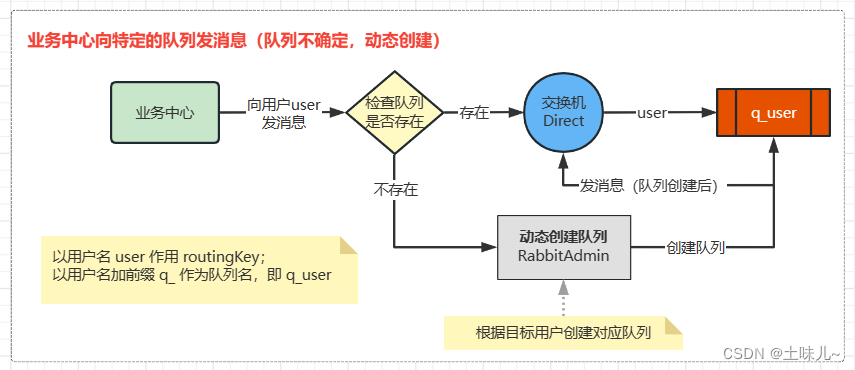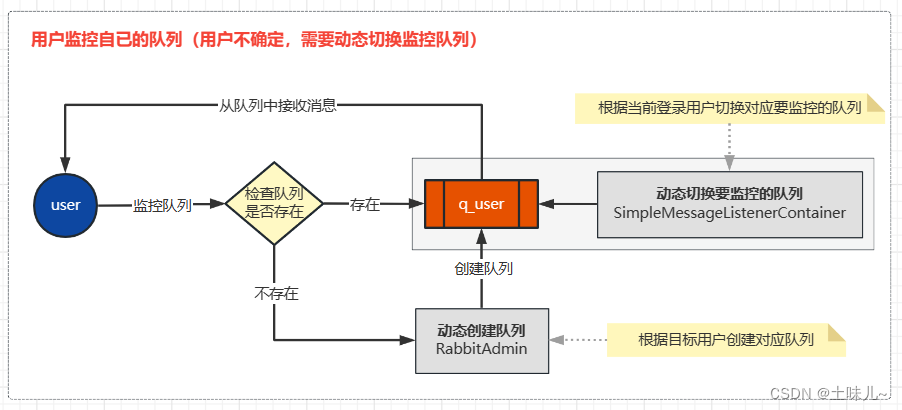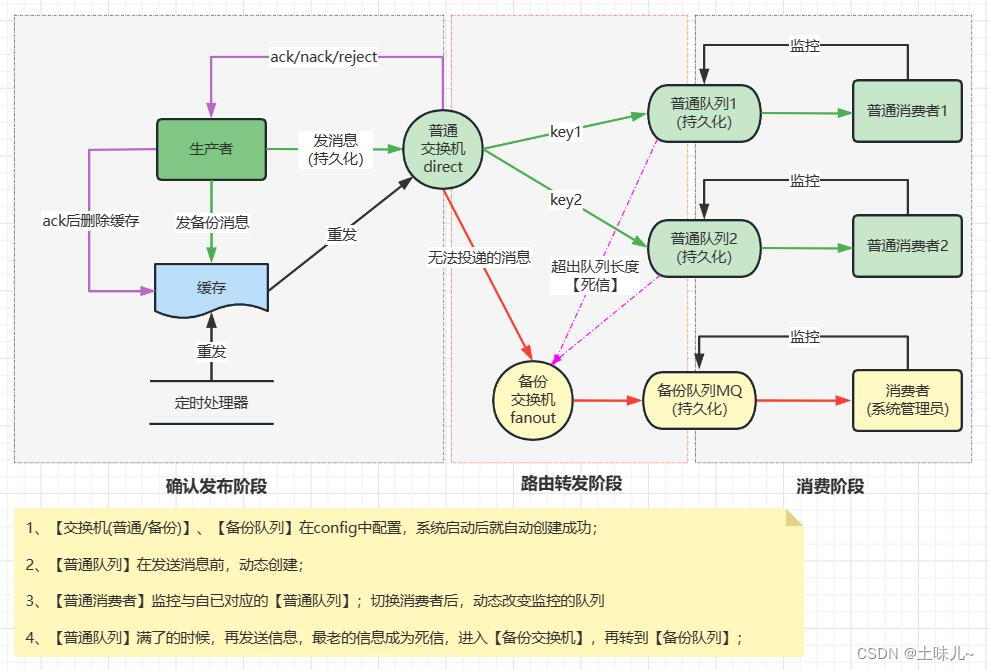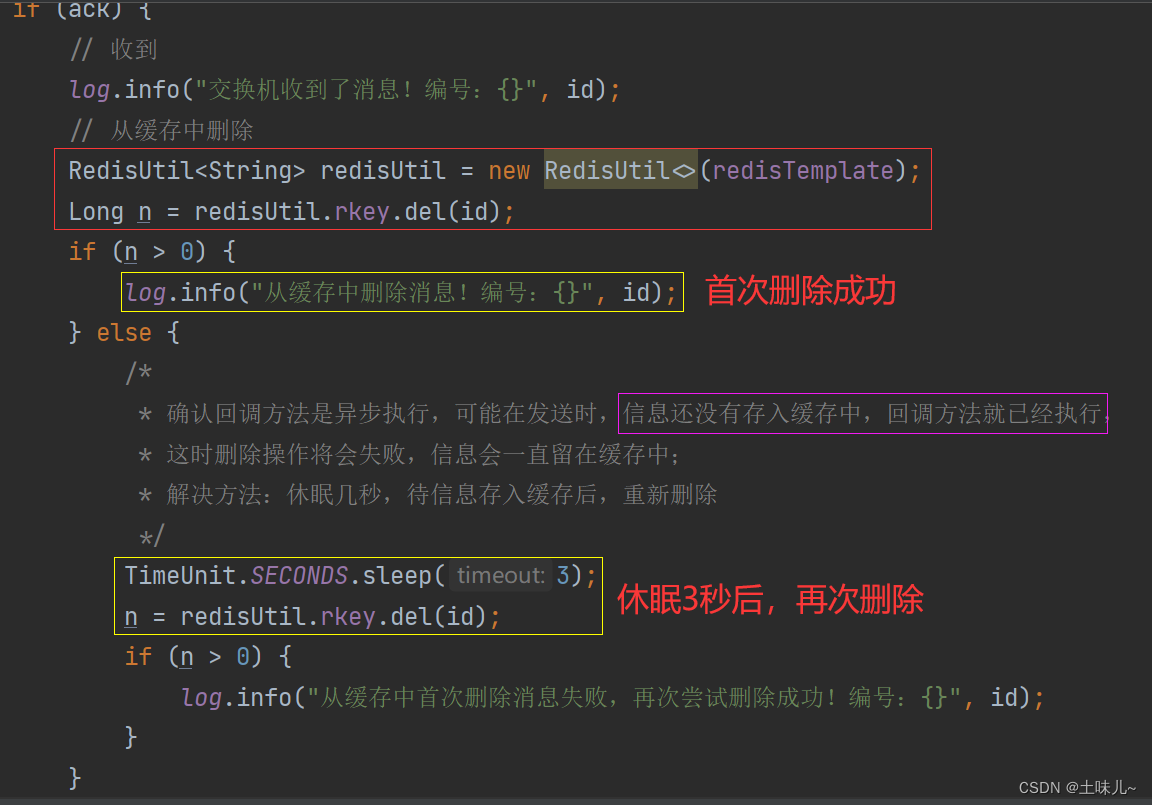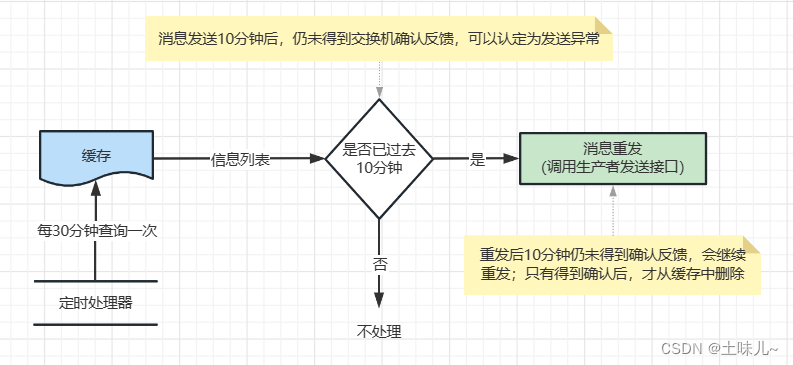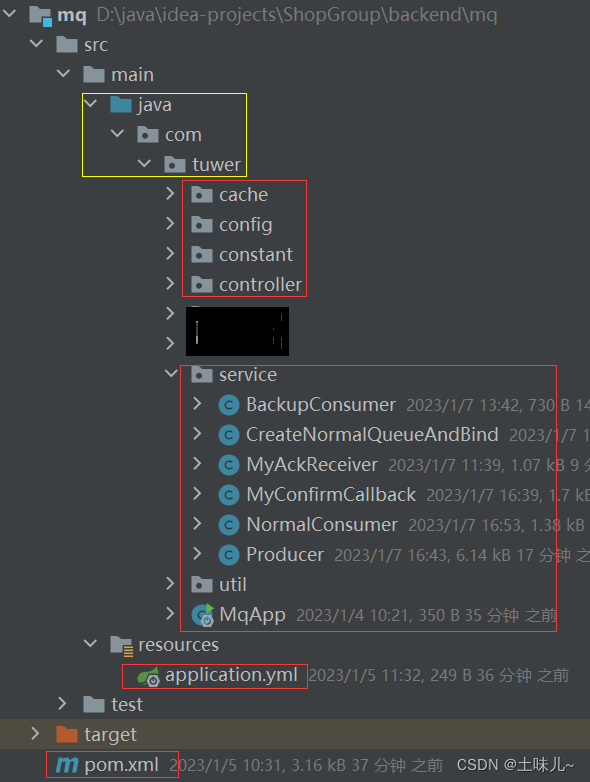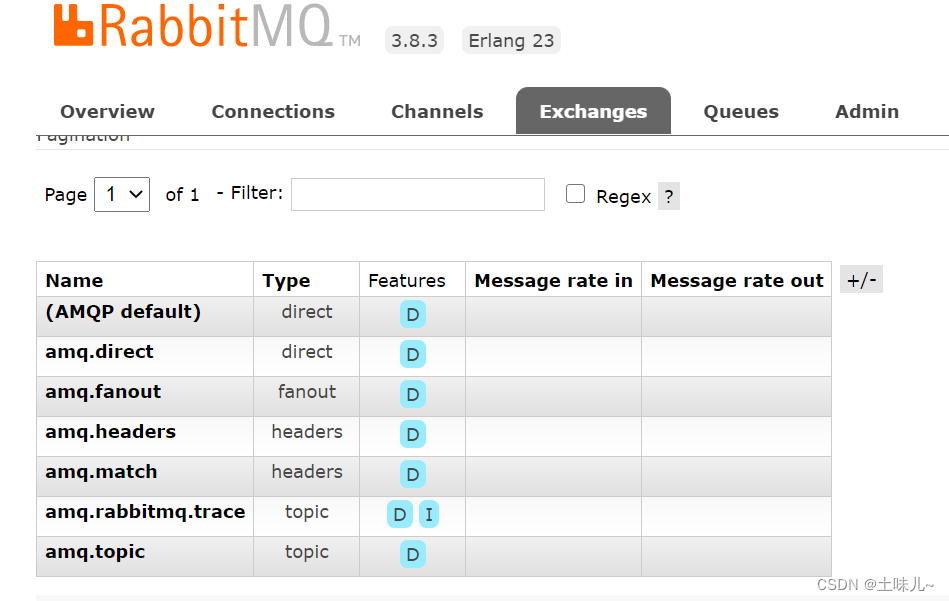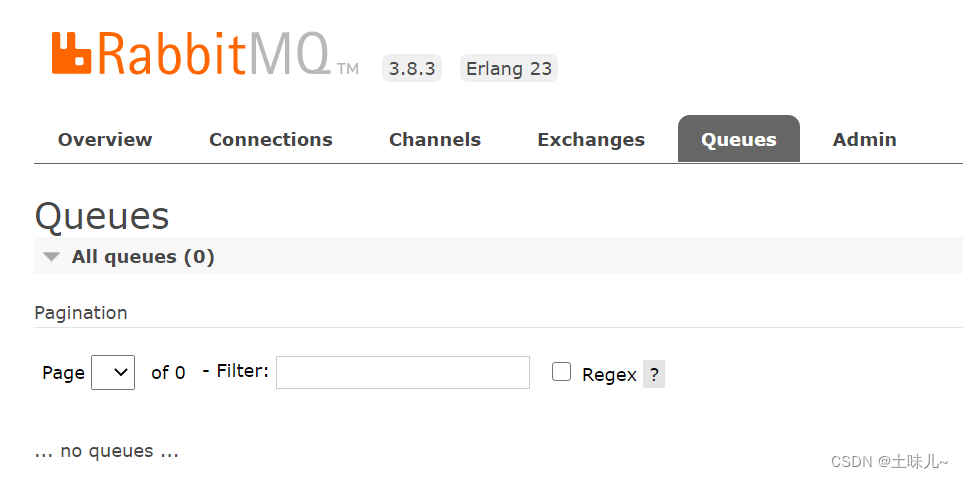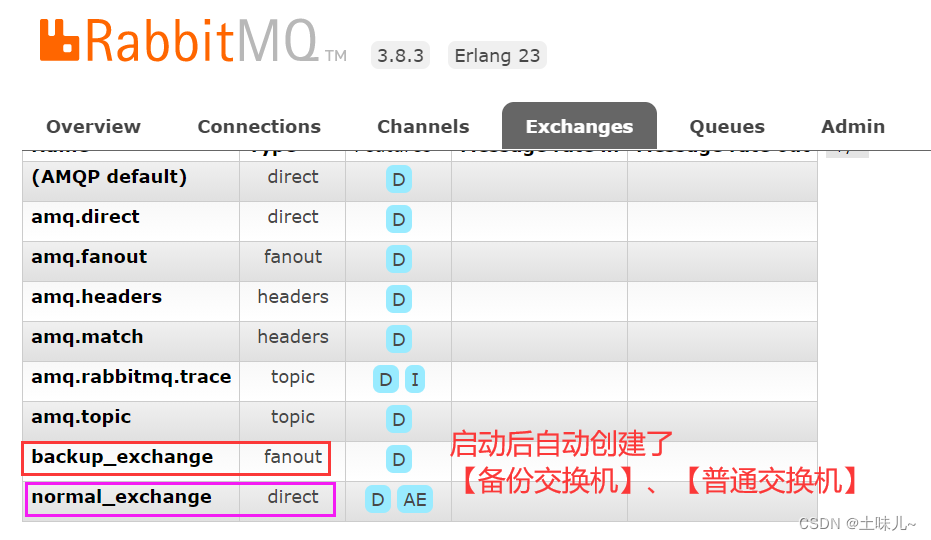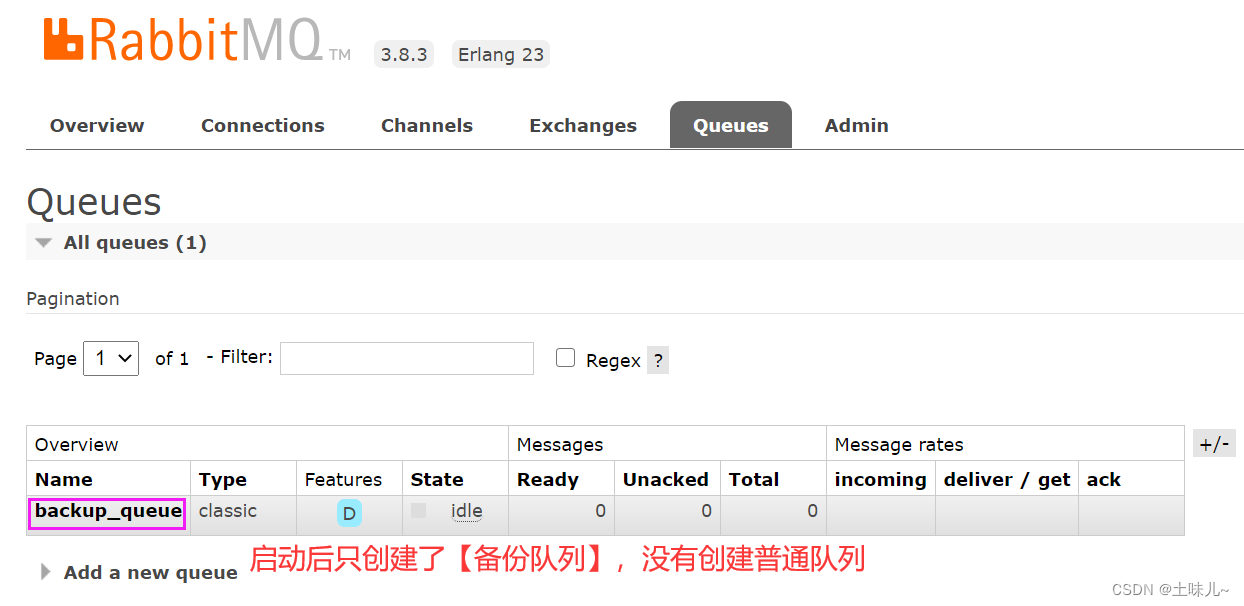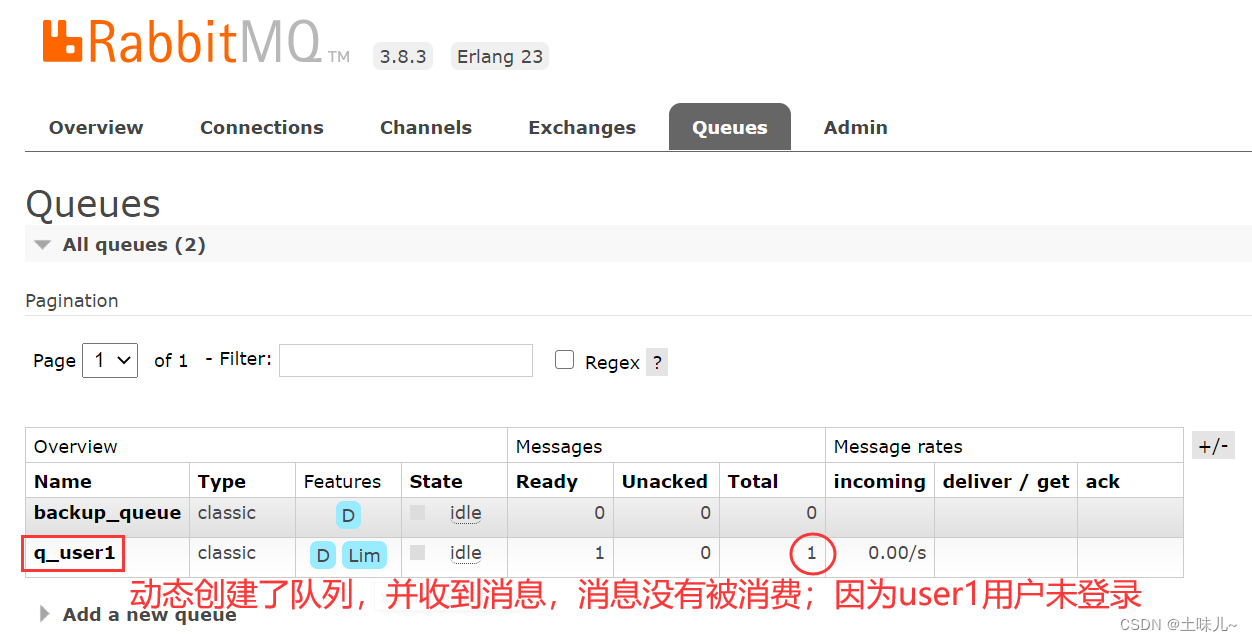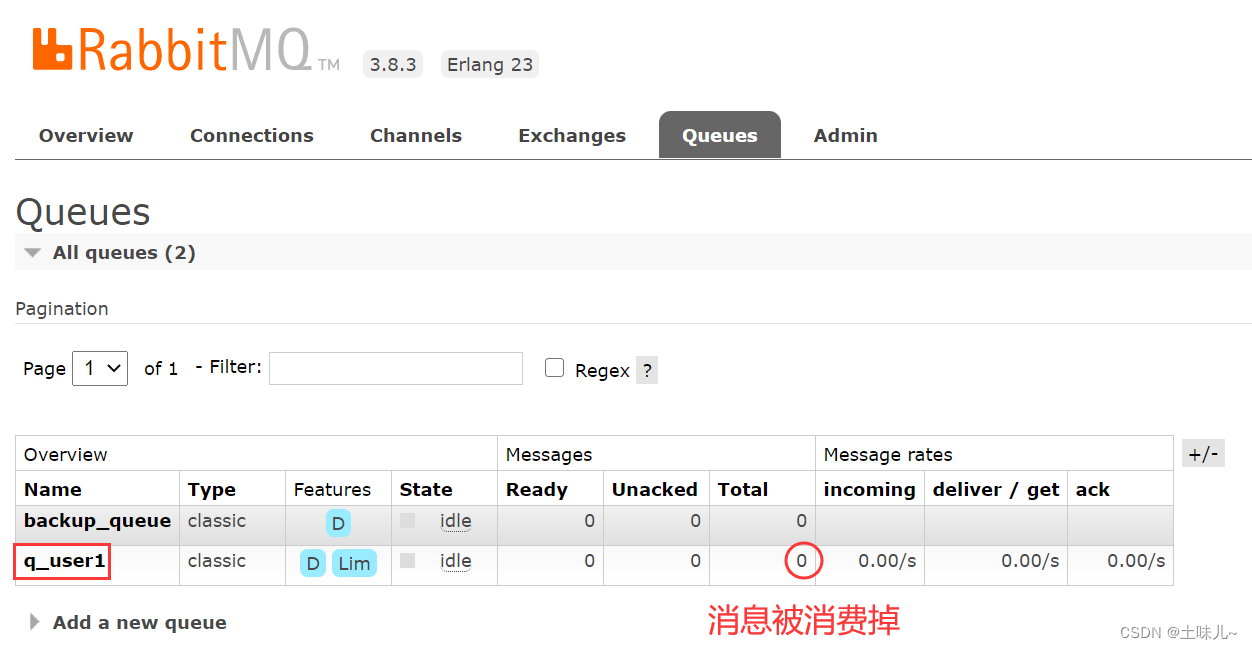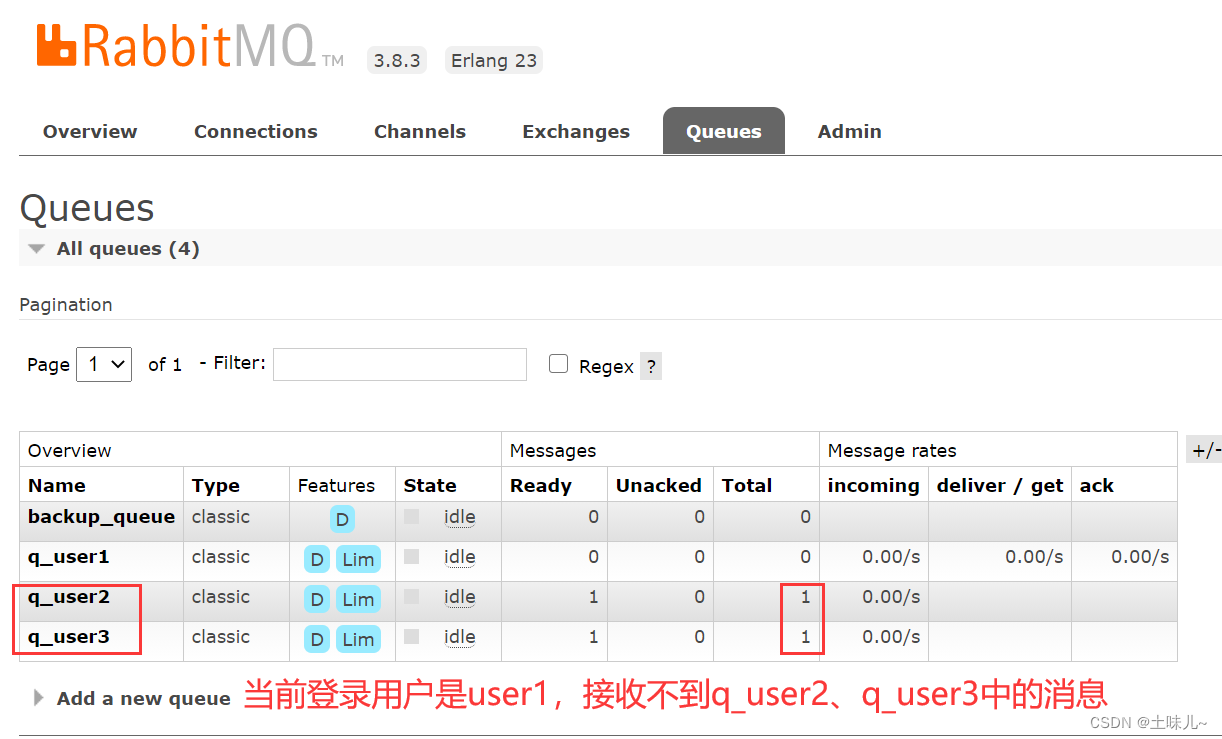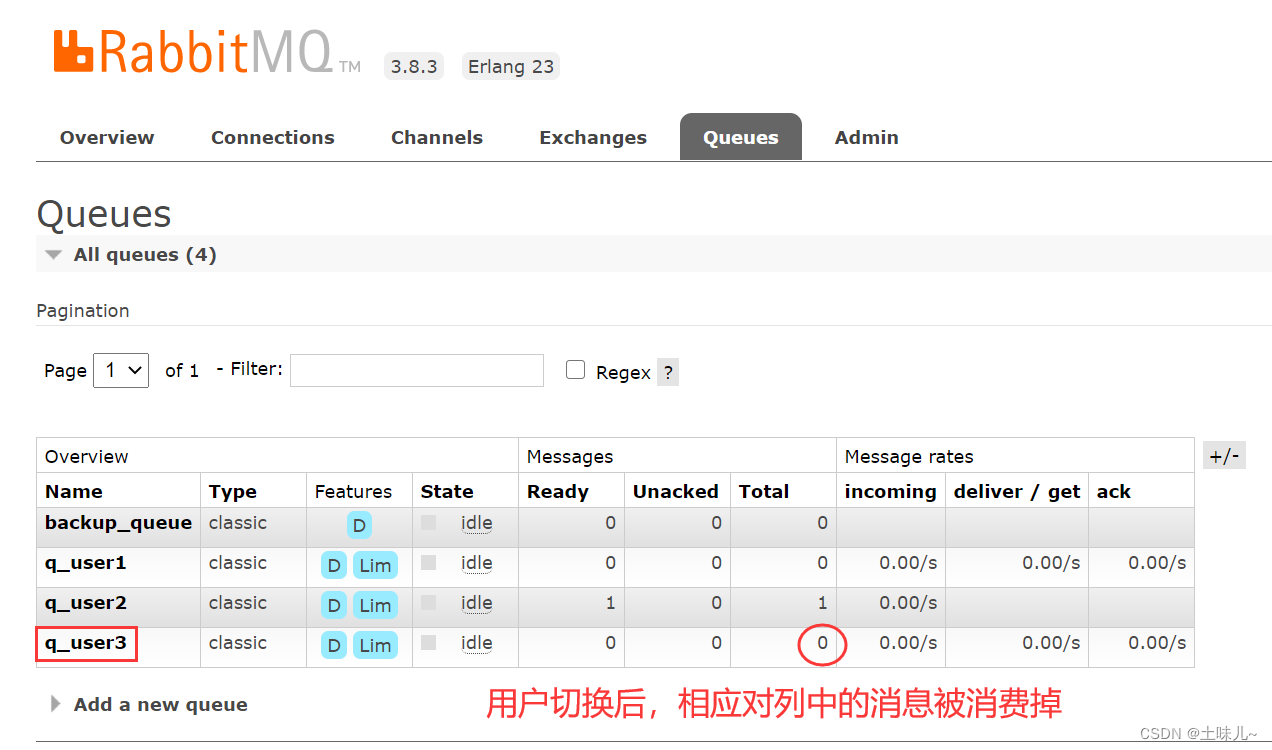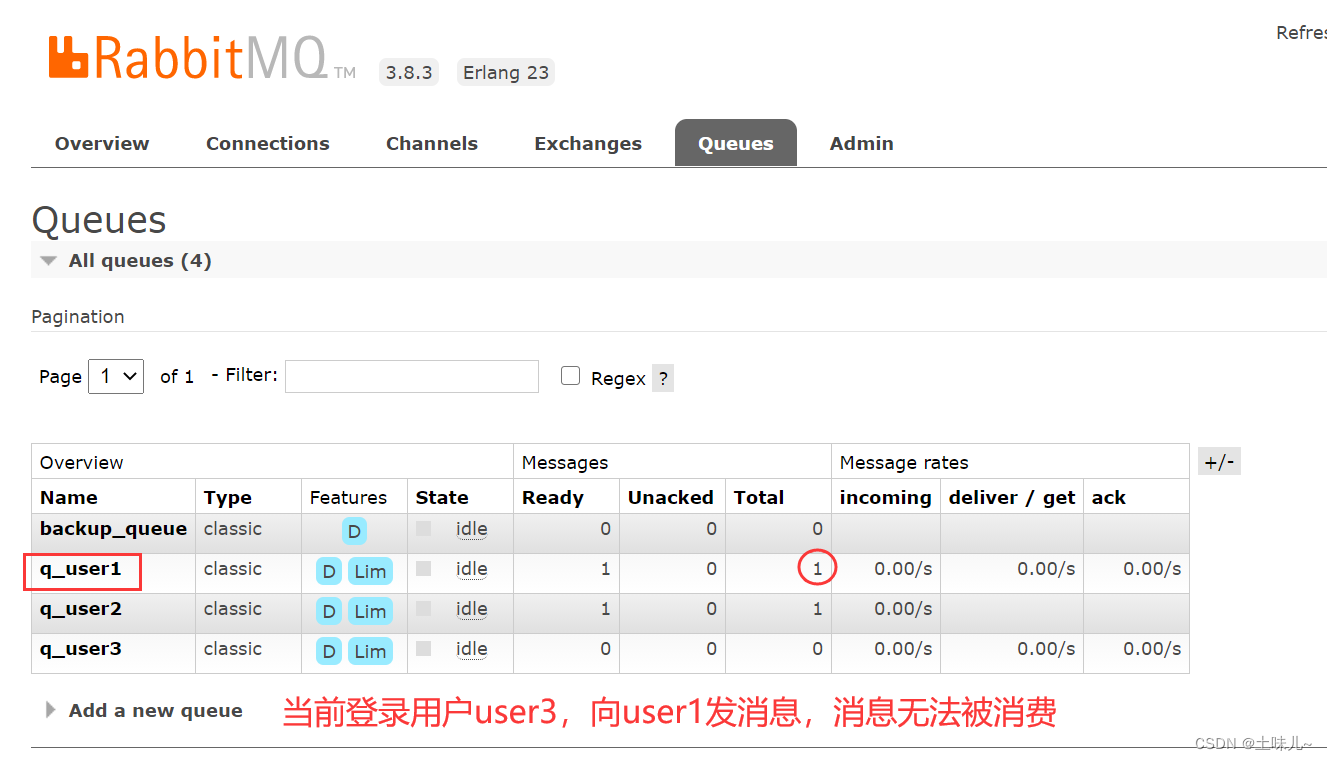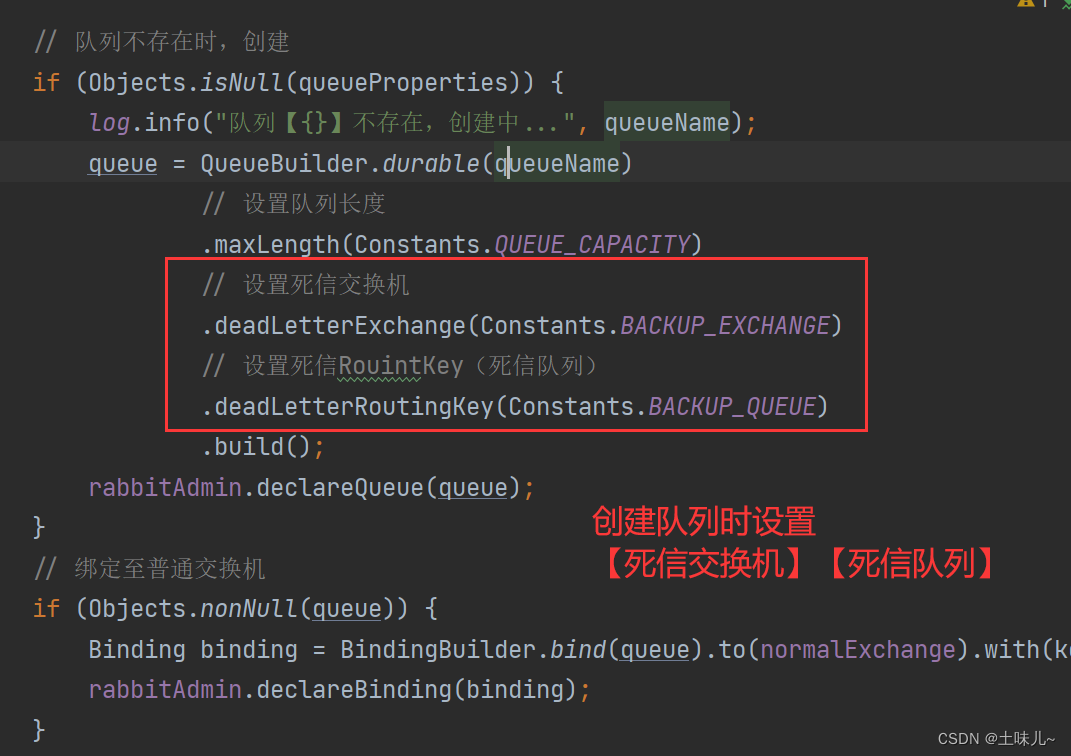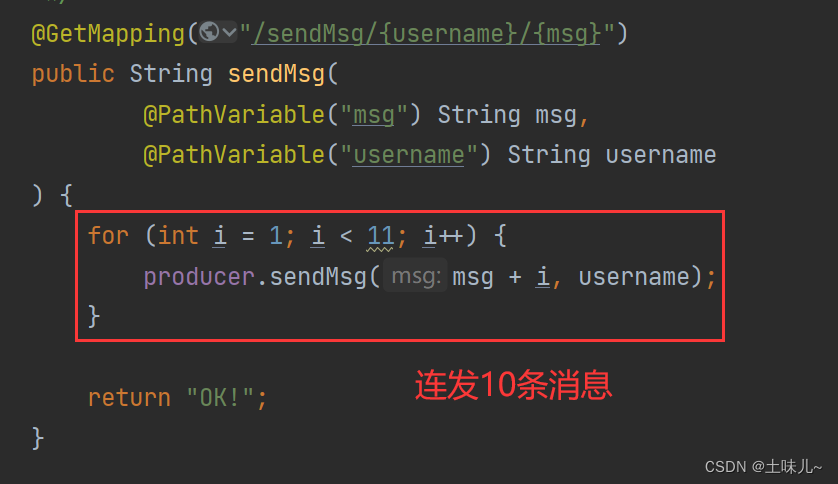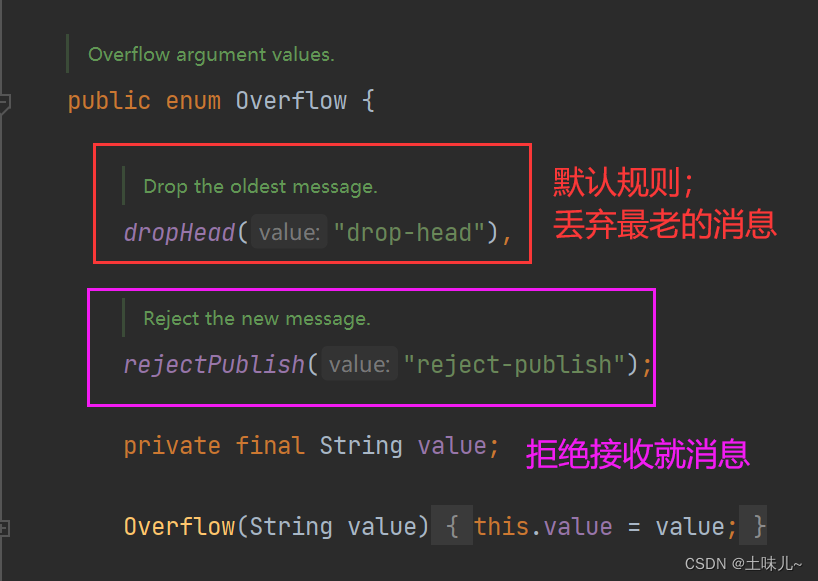一、应用场景
- 业务中心根据业务需求向特定用户发送消息;发送前不确定由哪个用户接收
- 特定用户接收特定消息;用户可以退出,再切换别的用户登录,用户登录后只接收与自已对应的消息
二、总体要求
项目要足够稳健,消息不能丢失
-
交换机、队列、消息持久化
-
队列有容量限制;如:3000
-
消息发送后需要确认(非自动确认)
-
未发送成功的消息,由缓存保存,定时重发
-
交换机收到消息,但无法投递时,转发至备份交换机,再广播至对应队列
-
费时操作采用异步方式
三、架构图
四、安装RabbitMQ
参考如下三篇文章
五、搭建SpringBoot项目
java1.8
spring-boot 2.6.7
1、依赖
<?xml version="1.0" encoding="UTF-8"?>
<project xmlns="http://maven.apache.org/POM/4.0.0"
xmlns:xsi="http://www.w3.org/2001/XMLSchema-instance"
xsi:schemaLocation="http://maven.apache.org/POM/4.0.0 http://maven.apache.org/xsd/maven-4.0.0.xsd">
<parent>
<groupId>org.springframework.boot</groupId>
<artifactId>spring-boot-starter-parent</artifactId>
<version>2.6.7</version>
</parent>
<modelVersion>4.0.0</modelVersion>
<groupId>com.tuwer</groupId>
<artifactId>mq</artifactId>
<version>1.0-SNAPSHOT</version>
<properties>
<maven.compiler.source>8</maven.compiler.source>
<maven.compiler.target>8</maven.compiler.target>
</properties>
<dependencies>
<!-- amqp-client -->
<dependency>
<groupId>org.springframework.boot</groupId>
<artifactId>spring-boot-starter-amqp</artifactId>
</dependency>
<dependency>
<groupId>org.springframework.boot</groupId>
<artifactId>spring-boot-starter-web</artifactId>
</dependency>
<!-- amqp-client Java原生依赖 -->
<!-- <dependency>
<groupId>com.rabbitmq</groupId>
<artifactId>amqp-client</artifactId>
<version>5.14.2</version>
</dependency>-->
<!-- hutool-all -->
<dependency>
<groupId>cn.hutool</groupId>
<artifactId>hutool-all</artifactId>
<version>5.8.2</version>
</dependency>
<!-- jackson -->
<dependency>
<groupId>com.fasterxml.jackson.core</groupId>
<artifactId>jackson-databind</artifactId>
<version>2.13.3</version>
</dependency>
<dependency>
<groupId>com.fasterxml.jackson.datatype</groupId>
<artifactId>jackson-datatype-jsr310</artifactId>
<version>2.13.3</version>
</dependency>
<dependency>
<groupId>jakarta.json</groupId>
<artifactId>jakarta.json-api</artifactId>
<version>2.0.1</version>
</dependency>
<!-- fastjson -->
<dependency>
<groupId>com.alibaba.fastjson2</groupId>
<artifactId>fastjson2</artifactId>
<version>2.0.3</version>
</dependency>
<!-- lombok -->
<dependency>
<groupId>org.projectlombok</groupId>
<artifactId>lombok</artifactId>
<version>1.18.22</version>
</dependency>
<!-- 工具类 -->
<dependency>
<groupId>commons-lang</groupId>
<artifactId>commons-lang</artifactId>
<version>2.6</version>
</dependency>
<!-- 测试 -->
<dependency>
<groupId>org.springframework.boot</groupId>
<artifactId>spring-boot-starter-test</artifactId>
<scope>test</scope>
</dependency>
<dependency>
<groupId>org.springframework.amqp</groupId>
<artifactId>spring-rabbit-test</artifactId>
<scope>test</scope>
</dependency>
</dependencies>
</project>
2、application.yml
spring:
rabbitmq:
host: 192.168.3.174
port: 5672
username: admin
password: admin
virtual-host: /
# 交换机接收确认
publisher-confirm-type: correlated
# 交换机回退消息
#publisher-returns: true
2、启动类
@EnableAsync开启异步操作
package com.tuwer;
import org.springframework.boot.SpringApplication;
import org.springframework.boot.autoconfigure.SpringBootApplication;
import org.springframework.scheduling.annotation.EnableAsync;
/**
* @author 土味儿
* Date 2023/1/4
* @version 1.0
*/
@EnableAsync
@SpringBootApplication
public class MqApp {
public static void main(String[] args) {
SpringApplication.run(MqApp.class, args);
}
}
3、基础类
3.1、常量类
package com.tuwer.constant;
/**
* <p>系统常量类</p>
*
* @author 土味儿
* Date 2023/1/4
* @version 1.0
*/
public class Constants {
/**
* 队列容量、通道预取值
* 队列容量应根据项目需要,设置合适的值;
* 本案例中为了测试方便设为5
*/
public static final int QUEUE_CAPACITY = 5;
public static final int PRE_FETCH_SIZE = 10;
/**
* 交换机
*/
public static final String NORMAL_EXCHANGE = "normal_exchange";
public static final String BACKUP_EXCHANGE = "backup_exchange";
/**
* 队列
*/
public static final String BACKUP_QUEUE = "backup_queue";
}
3.2、雪花算法工具类
获取Long型id:
SnowflakeUtil.getInstance().nextId()
package com.tuwer.util;
import lombok.extern.slf4j.Slf4j;
import java.text.MessageFormat;
/**
* <p>雪花算法工具类</p>
*
* @author 土味儿
* Date 2022/6/2
* @version 1.0
*/
@Slf4j
@SuppressWarnings("all")
public class SnowflakeUtil {
// ==============================Fields===========================================
/**
* 开始时间戳 (2000-01-01 00:00:00)
*/
private static final long TWEPOCH = 946656000000L;
/**
* 机器id所占的位数 5
*/
private static final long WORKER_ID_BITS = 5L;
/**
* 数据标识id所占的位数 5
*/
private static final long DATA_CENTER_ID_BITS = 5L;
/**
* 支持的最大机器id,结果是 31
*/
private static final long MAX_WORKER_ID = ~(-1L << WORKER_ID_BITS);
/**
* 支持的最大数据标识id,结果是 31
*/
private static final long MAX_DATA_CENTER_ID = ~(-1L << DATA_CENTER_ID_BITS);
/**
* 序列在id中占的位数
*/
private static final long SEQUENCE_BITS = 12L;
/**
* 机器ID向左移12位
*/
private static final long WORKER_ID_SHIFT = SEQUENCE_BITS;
/**
* 数据标识id向左移17位(12+5)
*/
private static final long DATA_CENTER_ID_SHIFT = SEQUENCE_BITS + WORKER_ID_BITS;
/**
* 时间戳向左移22位(5+5+12)
*/
private static final long TIMESTAMP_LEFT_SHIFT = SEQUENCE_BITS + WORKER_ID_BITS + DATA_CENTER_ID_BITS;
/**
* 生成序列的掩码,这里为4095 (0b111111111111=0xfff=4095)
*/
private static final long SEQUENCE_MASK = ~(-1L << SEQUENCE_BITS);
/**
* 步长 1024
*/
private static final long STEP_SIZE = 1024;
/**
* unsigned int max value
*/
private static final long UINT_MAX_VALUE = 0xffffffffL;
/**
* 工作机器ID(0~31)
*/
private long workerId;
/**
* 工作机器ID 计数器
*/
private long workerIdFlags = 0L;
/**
* 数据中心ID(0~31)
*/
private long dataCenterId;
/**
* 数据中心ID 计数器
*/
private long dataCenterIdFlags = 0L;
/**
* 毫秒内序列(0~4095)
*/
private long sequence = 0L;
/**
* 毫秒内序列基数[0|1024|2048|3072]
*/
private long basicSequence = 0L;
/**
* 上次生成ID的时间戳
*/
private long lastTimestamp = -1L;
/**
* 工作模式
*/
private final WorkMode workMode;
public enum WorkMode {NON_SHARED, RATE_1024, RATE_4096;}
//==============================单例模式(静态内部类)=====================================
private static class InnerClass{
private static final SnowflakeUtil INNER_DEMO = new SnowflakeUtil();
}
public static SnowflakeUtil getInstance(){
return InnerClass.INNER_DEMO;
}
//==============================Constructors=====================================
public SnowflakeUtil() {
this(0, 0, WorkMode.RATE_4096);
}
/**
* 构造函数
*
* @param workerId 工作ID (0~31)
* @param dataCenterId 数据中心ID (0~31)
*/
public SnowflakeUtil(long workerId, long dataCenterId) {
this(workerId, dataCenterId, WorkMode.RATE_4096);
}
/**
* 构造函数
*
* @param workerId 工作ID (0~31)
* @param dataCenterId 数据中心ID (0~31)
* @param workMode 工作模式
*/
public SnowflakeUtil(long workerId, long dataCenterId, WorkMode workMode) {
this.workMode = workMode;
if (workerId > MAX_WORKER_ID || workerId < 0) {
throw new IllegalArgumentException(MessageFormat.format("worker Id can't be greater than {0} or less than 0", MAX_WORKER_ID));
}
if (dataCenterId > MAX_DATA_CENTER_ID || dataCenterId < 0) {
throw new IllegalArgumentException(MessageFormat.format("datacenter Id can't be greater than {0} or less than 0", MAX_DATA_CENTER_ID));
}
this.workerId = workerId;
this.workerIdFlags = setSpecifiedBitTo1(this.workerIdFlags, this.workerId);
this.dataCenterId = dataCenterId;
this.dataCenterIdFlags = setSpecifiedBitTo1(this.dataCenterIdFlags, this.dataCenterId);
}
// ==============================Methods==========================================
/**
* 获取机器id
*
* @return 所属机器的id
*/
public long getWorkerId() {
return workerId;
}
/**
* 获取数据中心id
*
* @return 所属数据中心id
*/
public long getDataCenterId() {
return dataCenterId;
}
/**
* 获得下一个ID (该方法是线程安全的)
*
* @return SnowflakeId
*/
public synchronized long nextId() {
long timestamp = timeGen();
//如果当前时间小于上一次ID生成的时间戳,说明系统时钟回退过这个时候应当抛出异常
if (timestamp < this.lastTimestamp) {
if (timestamp > TWEPOCH) {
if (WorkMode.NON_SHARED == this.workMode) {
nonSharedClockBackwards(timestamp);
} else if (WorkMode.RATE_1024 == this.workMode) {
rate1024ClockBackwards(timestamp);
} else {
throw new RuntimeException(MessageFormat.format("Clock moved backwards. Refusing to generate id for {0} milliseconds", lastTimestamp - timestamp));
}
} else {
throw new RuntimeException(MessageFormat.format("Clock moved backwards. Refusing to generate id for {0} milliseconds", lastTimestamp - timestamp));
}
}
//如果是同一时间生成的,则进行毫秒内序列
if (this.lastTimestamp == timestamp) {
this.sequence = (this.sequence + 1) & SEQUENCE_MASK;
//毫秒内序列溢出
if (this.sequence == 0) {
//阻塞到下一个毫秒,获得新的时间戳
timestamp = tilNextMillis(this.lastTimestamp);
}
}
//时间戳改变,毫秒内序列重置
else {
this.sequence = this.basicSequence;
}
//上次生成ID的时间戳
this.lastTimestamp = timestamp;
//移位并通过或运算拼到一起组成64位的ID
return ((timestamp - TWEPOCH) << TIMESTAMP_LEFT_SHIFT)
| (this.dataCenterId << DATA_CENTER_ID_SHIFT)
| (this.workerId << WORKER_ID_SHIFT)
| this.sequence;
}
/**
* 阻塞到下一个毫秒,直到获得新的时间戳
*
* @param lastTimestamp 上次生成ID的时间戳
* @return 当前时间戳
*/
protected long tilNextMillis(long lastTimestamp) {
long timestamp0;
do {
timestamp0 = timeGen();
} while (timestamp0 <= lastTimestamp);
return timestamp0;
}
/**
* 返回以毫秒为单位的当前时间
*
* @return 当前时间(毫秒)
*/
protected long timeGen() {
return System.currentTimeMillis();
}
/**
* 尝试解决时钟回拨<br>【* 仅用于 单机生成不对外 的情况 *】
*
* @param timestamp 当前时间戳
* @return void
*/
private void nonSharedClockBackwards(long timestamp) {
if (this.dataCenterIdFlags >= UINT_MAX_VALUE && this.workerIdFlags >= UINT_MAX_VALUE) {
throw new RuntimeException(MessageFormat.format("Clock moved backwards. Refusing to generate id for {0} milliseconds", lastTimestamp - timestamp));
} else {
//如果仅用于生成不重复的数值,尝试变更 dataCenterId 或 workerId 修复时钟回拨问题
log.warn("Clock moved backwards. Refusing to generate id for {} milliseconds", lastTimestamp - timestamp);
//先尝试变更 dataCenterId,当 dataCenterId 轮询一遍之后,尝试变更 workerId 并重置 dataCenterId
if (this.dataCenterIdFlags >= UINT_MAX_VALUE) {
if (++this.workerId > MAX_WORKER_ID) {
this.workerId = 0L;
}
this.workerIdFlags = setSpecifiedBitTo1(this.workerIdFlags, this.workerId);
// 重置 dataCenterId 和 dataCenterIdFlags
this.dataCenterIdFlags = this.dataCenterId = 0L;
} else {
if (++this.dataCenterId > MAX_DATA_CENTER_ID) {
this.dataCenterId = 0L;
}
}
this.dataCenterIdFlags = setSpecifiedBitTo1(this.dataCenterIdFlags, this.dataCenterId);
this.lastTimestamp = -1L;
log.warn("Try to fix the clock moved backwards. timestamp : {}, worker Id : {}, datacenter Id : {}", timestamp, workerId, dataCenterId);
}
}
/**
* 尝试解决时钟回拨<br>【* 仅用于每毫秒生成量 不大于 1024 的情况 *】
*
* @param timestamp 当前时间戳
* @return void
*/
private void rate1024ClockBackwards(long timestamp) {
if (this.basicSequence > (SEQUENCE_MASK - STEP_SIZE)) {
throw new RuntimeException(MessageFormat.format("Clock moved backwards. Refusing to generate id for {0} milliseconds", lastTimestamp - timestamp));
} else {
log.warn("Clock moved backwards. Refusing to generate id for {} milliseconds", lastTimestamp - timestamp);
this.basicSequence += STEP_SIZE;
this.lastTimestamp = -1L;
log.warn("Try to fix the clock moved backwards. timestamp : {}, basicSequence : {}", timestamp, basicSequence);
}
}
/**
* Set the specified bit to 1
*
* @param value raw long value
* @param index bit index (From 0~31)
* @return long value
*/
private long setSpecifiedBitTo1(long value, long index) {
return value |= (1L << index);
}
/**
* Set the specified bit to 0
*
* @param value raw long value
* @param index bit index (From 0~31)
* @return long value
*/
private long setSpecifiedBitTo0(long value, long index) {
return value &= ~(1L << index);
}
/**
* Get the specified bit
*
* @param value raw long value
* @param index bit index(From 0-31)
* @return 0 or 1
*/
private int getSpecifiedBit(long value, long index) {
return (value & (1L << index)) == 0 ? 0 : 1;
}
}
3.3、缓存模型类
缓存操作不是本文的重点,用模型类代替;实际部署时可换作redis
package com.tuwer.cache;
import java.util.Set;
import java.util.concurrent.ConcurrentNavigableMap;
import java.util.concurrent.ConcurrentSkipListMap;
/**
* 模拟缓存
*
* @author 土味儿
* Date 2023/1/3
* @version 1.0
*/
public class CacheModel {
/**
* 并发Map
*/
private static ConcurrentSkipListMap<Long, String> cache = new ConcurrentSkipListMap<>();
/**
* 存入缓存
*
* @param key
* @param value
*/
public static void put(Long key, String value) {
cache.put(key, value);
System.out.println("存入缓存;【key】" + key + "【value】" + value);
print();
}
/**
* 获取value
*
* @param key
* @return
*/
public static String get(Long key) {
String v = cache.get(key);
System.out.println("从缓存中获取;【key】" + key + "【value】" + v);
return v;
}
/**
* 删除key
*
* @param key
*/
public static void del(Long key) {
String v = cache.remove(key);
System.out.println("从缓存中删除;【key】" + key + "【value】" + v);
print();
}
/**
* 删除小于等于key的多个值
*
* @param key
*/
public static void delMany1(Long key) {
Set<Long> keys = cache.keySet();
int n = 0;
for (Long k : keys) {
if (k <= key) {
cache.remove(k);
n++;
}
}
System.out.println("从缓存中删除小于等于;【" + key + "】的多个值;共有 " + n + " 个");
print();
}
/**
* 删除小于等于key的多个值
* ConcurrentNavigableMap
* @param key
*/
public static void delMany(Long key) {
// 得到批量确认信息Map(只能得到小于key的值)
ConcurrentNavigableMap<Long, String> confirmMap = cache.headMap(key);
System.out.println("从缓存中删除小于等于;【" + key + "】的多个值;共有 " + (confirmMap.size() + 1) + " 个");
// 清空已经确认的
confirmMap.clear();
// 单独再删除等于key的值
cache.remove(key);
print();
}
public static void print() {
System.out.println("当前缓存大小:" + cache.size());
Set<Long> keys = cache.keySet();
for (Long key : keys) {
System.out.print(key);
System.out.print(" | ");
//System.out.println(cache.get(key));
}
System.out.println();
}
}
4、配置类 MqConfig.java
package com.tuwer.config;
import com.tuwer.constant.Constants;
import org.springframework.amqp.core.*;
import org.springframework.amqp.rabbit.connection.CachingConnectionFactory;
import org.springframework.amqp.rabbit.core.RabbitAdmin;
import org.springframework.amqp.rabbit.core.RabbitTemplate;
import org.springframework.amqp.rabbit.listener.SimpleMessageListenerContainer;
import org.springframework.beans.factory.annotation.Qualifier;
import org.springframework.context.annotation.Bean;
import org.springframework.context.annotation.Configuration;
import javax.annotation.PostConstruct;
import javax.annotation.Resource;
/**
* <p>配置类</p>
*
* @author 土味儿
* Date 2023/1/5
* @version 1.0
*/
@Configuration
public class MqConfig {
@Resource
private CachingConnectionFactory connectionFactory;
@Resource
private RabbitTemplate rabbitTemplate;
@PostConstruct
public void init(){
System.out.println("初始化...");
// 删除普通空队列(排除掉备份队列),减轻RabbitMQ的压力
}
/**
* 获取普通交换机
*
* @return
*/
@Bean("normalExchange")
public DirectExchange getNormalExchange() {
return ExchangeBuilder
.directExchange(Constants.NORMAL_EXCHANGE)
// 持久化
.durable(true)
// 备份(候补)交换机
.withArgument("alternate-exchange", Constants.BACKUP_EXCHANGE)
.build();
}
/**
* 备份交换机
* 类型:fanout
*
* @return
*/
@Bean("backupExchange")
public FanoutExchange getBackupExchange() {
return new FanoutExchange(Constants.BACKUP_EXCHANGE);
}
/**
* 获取备份队列
*
* @return
*/
@Bean("backupQueue")
public Queue getBackupQueue() {
return QueueBuilder.durable(Constants.BACKUP_QUEUE).build();
}
/**
* 备份队列 绑定 备份交换机
*
* @param queue
* @param exchange
* @return
*/
@Bean
public Binding backupQueueBindBackupExchange(
@Qualifier("backupQueue") Queue queue,
@Qualifier("backupExchange") FanoutExchange exchange
) {
return BindingBuilder.bind(queue).to(exchange);
}
/**
* 用于动态创建队列、交换机,并绑定
* @return
*/
@Bean
public RabbitAdmin rabbitAdmin(){
//return new RabbitAdmin(connectionFactory);
return new RabbitAdmin(rabbitTemplate);
}
/**
* 用于设置动态监听
* @return
*/
@Bean
public SimpleMessageListenerContainer simpleMessageListenerContainer(){
SimpleMessageListenerContainer container = new SimpleMessageListenerContainer();
container.setConnectionFactory(connectionFactory);
container.setConcurrentConsumers(10);
container.setMaxConcurrentConsumers(50);
// 手动确认
container.setAcknowledgeMode(AcknowledgeMode.MANUAL);
// 预取值
container.setPrefetchCount(Constants.PRE_FETCH_SIZE);
// 创建队列(在用户登录后创建)
//createNormalQueueAndBind.create(username);
//listenerContainer.setQueueNames("q_" + username);
//listenerContainer.setMessageListener(myAckReceiver);
return container;
}
}
5、普通队列动态创建类
package com.tuwer.service;
import com.tuwer.constant.Constants;
import lombok.extern.slf4j.Slf4j;
import org.springframework.amqp.core.*;
import org.springframework.amqp.rabbit.core.RabbitAdmin;
import org.springframework.stereotype.Component;
import javax.annotation.Resource;
import java.util.Locale;
import java.util.Objects;
import java.util.Properties;
/**
* <p>动态创建队列</p>
*
* @author 土味儿
* Date 2023/1/7
* @version 1.0
*/
@Component
@Slf4j
public class CreateNormalQueueAndBind {
@Resource
private DirectExchange normalExchange;
@Resource
private RabbitAdmin rabbitAdmin;
/**
* 动态创建普通队列,并绑定至普通交换机
*
* @param routingKey
*/
public void create(String routingKey) {
String key = routingKey.toLowerCase(Locale.ROOT);
String queueName = "q_" + key;
// 创建普通队列
Queue queue = null;
// 查询队列属性,为null时,表示队列不存在
Properties queueProperties = rabbitAdmin.getQueueProperties(queueName);
// 队列不存在时,创建
if (Objects.isNull(queueProperties)) {
log.info("队列【{}】不存在,创建中...", queueName);
queue = QueueBuilder.durable(queueName).maxLength(Constants.QUEUE_CAPACITY).build();
rabbitAdmin.declareQueue(queue);
}
// 绑定至普通交换机
if (Objects.nonNull(queue)) {
Binding binding = BindingBuilder.bind(queue).to(normalExchange).with(key);
rabbitAdmin.declareBinding(binding);
}
}
}
经过测试,如果队列满了的时候,再向队列发送消息时,最老的消息被丢弃,且不会启用备份交换机;为了防止信息丢失,加入
死信交换机和死信队列,当前队列满了的时候,最老的信息进入死信交换机,再转至死信队列
- 原代码
// 原
queue = QueueBuilder.durable(queueName)
.maxLength(Constants.QUEUE_CAPACITY)
.build();
- 新代码
// 新
queue = QueueBuilder.durable(queueName)
// 设置队列长度
.maxLength(Constants.QUEUE_CAPACITY)
// 设置死信交换机
.deadLetterExchange(Constants.BACKUP_EXCHANGE)
// 设置死信RoutingKey(死信队列)
.deadLetterRoutingKey(Constants.BACKUP_QUEUE)
// 改变溢出规则:当队列溢出时,拒绝接收新消息
//.overflow(QueueBuilder.Overflow.rejectPublish)
.build();
6、发布确认回调类
package com.tuwer.service;
import com.tuwer.cache.CacheModel;
import lombok.extern.slf4j.Slf4j;
import org.springframework.amqp.rabbit.connection.CorrelationData;
import org.springframework.amqp.rabbit.core.RabbitTemplate;
import org.springframework.stereotype.Component;
import javax.annotation.PostConstruct;
import javax.annotation.Resource;
/**
* <p>发布确认回调类</p>
*
* @author 土味儿
* Date 2023/1/5
* @version 1.0
*/
@Slf4j
@Component
public class MyConfirmCallback implements RabbitTemplate.ConfirmCallback {
@Resource
private RabbitTemplate rabbitTemplate;
/**
* 把当前类注入到 RabbitTemplate
*
* @PostConstruct 表示在执行当前类的构造时运行
* 因为 ConfirmCallback接口是 RabbitTemplate的内部类
*/
@PostConstruct
public void init() {
rabbitTemplate.setConfirmCallback(this);
}
/**
* 交换机确认回调方法
*
* @param correlationData 回调消息
* @param ack 交换机是否确认收到了消息:true:收到了;false:没有收到
* @param cause 没有收到消息的原因
*/
@Override
public void confirm(CorrelationData correlationData, boolean ack, String cause) {
// 消息ID
String id = correlationData != null ? correlationData.getId() : "";
if (ack) {
// 收到
log.info("交换机收到了消息!编号:{}", id);
// 从缓存中删除
CacheModel.del(Long.parseLong(id));
} else {
// 未收到
log.info("交换机没有收到编号为:{} 的消息!原因:{}", id, cause);
}
}
}
从缓存中删除的优化操作
-
采用Redis后发现的问题:
部分信息确认后没有从Redis中删除成功;-
分析原因:确认回调方法是异步执行,可能在发送时,信息还没有存入缓存中,回调方法就已经执行, 这时删除操作将会失败,信息会一直留在缓存中;
-
解决方法:休眠几秒,待信息存入缓存后,重新删除
-
- 代码优化
@Override
@SneakyThrows
public void confirm(CorrelationData correlationData, boolean ack, String cause) {
// 消息ID
String id = correlationData != null ? correlationData.getId() : "";
if (ack) {
// 收到
log.info("交换机收到了消息!编号:{}", id);
// 从缓存中删除
RedisUtil<String> redisUtil = new RedisUtil<>(redisTemplate);
Long n = redisUtil.rkey.del(id);
if (n > 0) {
log.info("从缓存中删除消息!编号:{}", id);
} else {
/*
* 确认回调方法是异步执行,可能在发送时,信息还没有存入缓存中,回调方法就已经执行,
* 这时删除操作将会失败,信息会一直留在缓存中;
* 解决方法:休眠几秒,待信息存入缓存后,重新删除
*/
TimeUnit.SECONDS.sleep(3);
n = redisUtil.rkey.del(id);
if (n > 0) {
log.info("从缓存中首次删除消息失败,再次尝试删除成功!编号:{}", id);
}
}
} else {
// 未收到
log.info("交换机没有收到编号为:{} 的消息!原因:{}", id, cause);
}
}
7、生产者服务类
发送消息采用异步方式
@Async
package com.tuwer.service;
import com.tuwer.cache.CacheModel;
import com.tuwer.constant.Constants;
import com.tuwer.util.SnowflakeUtil;
import lombok.extern.slf4j.Slf4j;
import org.springframework.amqp.rabbit.connection.CorrelationData;
import org.springframework.amqp.rabbit.core.RabbitTemplate;
import org.springframework.scheduling.annotation.Async;
import org.springframework.stereotype.Component;
import javax.annotation.Resource;
import java.util.*;
/**
* <p>生产者</p>
*
* @author 土味儿
* Date 2023/1/4
* @version 1.0
*/
@Component
@Slf4j
public class Producer {
@Resource
private RabbitTemplate rabbitTemplate;
@Resource
private CreateNormalQueueAndBind createNormalQueueAndBind;
/**
* 异步发送消息
*
* @param msg
*/
@Async
public void sendMsg(String msg, String routingKey) {
String key = routingKey.toLowerCase(Locale.ROOT);
// 创建普通队列,并绑定至普通交换机
createNormalQueueAndBind.create(key);
long id = SnowflakeUtil.getInstance().nextId();
CorrelationData correlationData = new CorrelationData(String.valueOf(id));
rabbitTemplate.convertAndSend(
Constants.NORMAL_EXCHANGE,
key,
msg,
correlationData);
// 存入缓存
CacheModel.put(id, msg);
log.info("消息:【{}】已发送!编号:{}", msg, correlationData.getId());
}
}
8、消费者服务类
8.1、备份队列消费者
备份队列固定不变;config中配置,系统启动后自动创建
package com.tuwer.service;
import com.tuwer.config.MqConfig;
import com.tuwer.constant.Constants;
import lombok.extern.slf4j.Slf4j;
import org.springframework.amqp.core.Message;
import org.springframework.amqp.rabbit.annotation.RabbitListener;
import org.springframework.stereotype.Component;
/**
* <p>备份消费者</p>
*
* @author 土味儿
* Date 2023/1/5
* @version 1.0
*/
@Slf4j
@Component
public class BackupConsumer {
/**
* 监听备份队列消息
* @param message
*/
@RabbitListener(queues = Constants.BACKUP_QUEUE)
public void receiveMsg(Message message){
String msg = new String(message.getBody());
log.info("接收到备份队列的消息:【{}】", msg);
}
}
8.2、普通队列消费者
队列不确定;用户登录后,动态切换要监控的队列;
如果用户退出后,也要更新监控列表;省略
package com.tuwer.service;
import lombok.extern.slf4j.Slf4j;
import org.springframework.amqp.rabbit.listener.SimpleMessageListenerContainer;
import org.springframework.stereotype.Component;
import javax.annotation.Resource;
/**
* <p>普通消费者</p>
*
* @author 土味儿
* Date 2023/1/5
* @version 1.0
*/
@Slf4j
@Component
public class NormalConsumer {
@Resource
private SimpleMessageListenerContainer listenerContainer;
@Resource
private MyAckReceiver myAckReceiver;
@Resource
private CreateNormalQueueAndBind createNormalQueueAndBind;
/**
* 监听普通队列消息
* 动态切换要监控的队列
*
* @param username
*/
//@RabbitListener(queues = "队列名称")
public void receiveMsg(String username) {
// 创建队列
createNormalQueueAndBind.create(username);
// 设置要监听的队列(用set,不是add)
listenerContainer.setQueueNames("q_" + username);
// 设置消息接收器
listenerContainer.setMessageListener(myAckReceiver);
// 当前监听的队列列表
String[] queueNames = listenerContainer.getQueueNames();
System.out.println("当前监听的队列:");
for (String queueName : queueNames) {
System.out.println(queueName);
}
System.out.println("----------");
}
}
- 消息接收器
package com.tuwer.service;
import com.rabbitmq.client.Channel;
import lombok.extern.slf4j.Slf4j;
import org.springframework.amqp.core.Message;
import org.springframework.amqp.rabbit.listener.api.ChannelAwareMessageListener;
import org.springframework.stereotype.Component;
/**
* <p>消息接收器</p>
*
* @author 土味儿
* Date 2023/1/7
* @version 1.0
*/
@Slf4j
@Component
public class MyAckReceiver implements ChannelAwareMessageListener {
@Override
public void onMessage(Message message, Channel channel) throws Exception {
long deliveryTag = message.getMessageProperties().getDeliveryTag();
try {
String consumerQueue = message.getMessageProperties().getConsumerQueue();
String msg = new String(message.getBody());
log.info("MyAckReceiver的【{}】队列,收到的消息:【{}】", consumerQueue, msg);
channel.basicAck(deliveryTag, true);
} catch (Exception e) {
channel.basicReject(deliveryTag, false);
e.printStackTrace();
}
}
}
9、Controller接口类
9.1、发送消息
http://localhost:8080/sendMsg/用户名/消息
package com.tuwer.controller;
import com.tuwer.service.Producer;
import lombok.extern.slf4j.Slf4j;
import org.springframework.web.bind.annotation.GetMapping;
import org.springframework.web.bind.annotation.PathVariable;
import org.springframework.web.bind.annotation.RestController;
import javax.annotation.Resource;
/**
* <p>发送消息</p>
*
* @author 土味儿
* Date 2023/1/5
* @version 1.0
*/
@Slf4j
@RestController
public class ProducerController {
@Resource
private Producer producer;
/**
* 发送消息
*
* @param msg 消息内容
* @param username 接收消息的用户
* @return
*/
@GetMapping("/sendMsg/{username}/{msg}")
public String sendMsg(
@PathVariable("msg") String msg,
@PathVariable("username") String username
) {
producer.sendMsg(msg, username);
return "OK!";
}
}
9.2、模拟用户登录
http://localhost:8080/login/用户名
package com.tuwer.controller;
import com.tuwer.service.NormalConsumer;
import lombok.extern.slf4j.Slf4j;
import org.springframework.web.bind.annotation.GetMapping;
import org.springframework.web.bind.annotation.PathVariable;
import org.springframework.web.bind.annotation.RequestMapping;
import org.springframework.web.bind.annotation.RestController;
import javax.annotation.Resource;
/**
* <p>模拟登录</p>
*
* @author 土味儿
* Date 2023/1/7
* @version 1.0
*/
@Slf4j
@RestController
@RequestMapping("/login")
public class LoginController {
@Resource
private NormalConsumer consumer;
/**
* 登录
*
* @param username
* @return
*/
@GetMapping("/{username}")
public String login(
@PathVariable("username") String username
) {
log.info("用户 {} 已登录", username);
// 接收该用户的队列消息
consumer.receiveMsg(username);
return username;
}
}
10、定时重发
缓存中未得到确认的消息,由定时器重新发送;
信息重发调度器(这是系统优化后增加的类)
增加了信息实体类 MqMsg
增加了异步发送多条信息方法
sendMsg(List<MqMsg> listOfMqMsg)
package com.tuwer.service;
import com.alibaba.fastjson2.JSON;
import com.tuwer.pojo.po.MqMsg;
import com.tuwer.util.RedisUtil;
import lombok.extern.slf4j.Slf4j;
import org.springframework.data.redis.core.RedisTemplate;
import org.springframework.scheduling.annotation.Scheduled;
import org.springframework.stereotype.Component;
import javax.annotation.Resource;
import java.time.Instant;
import java.time.ZoneId;
import java.util.HashMap;
import java.util.Map;
import java.util.Set;
/**
* <p>调度器</p>
*
* @author 土味儿
* Date 2023/1/13
* @version 1.0
*/
@Slf4j
@Component
public class Scheduler {
@Resource
private RedisTemplate redisTemplate;
@Resource
private Producer producer;
/**
* 缓存信息重发(每30分钟检查一次)
*/
@Scheduled(cron = "0 0/30 * * * ?")
public void resendForCache() {
log.info("开始执行缓存信息重发...");
// 1、从缓存中获取全部信息(key集合)
RedisUtil<String> redisUtil = new RedisUtil<>(redisTemplate);
Set<String> keys = redisUtil.rkey.keys("*");
int s1 = keys.size();
if (s1 < 1) {
log.info("缓存中没有信息!");
return;
}
log.info("从缓存中获取到 {} 条信息!", s1);
// 2、遍历分析信息
String msgJson;
MqMsg mqMsg;
List<MqMsg> list = new ArrayList<>();
// 需要重发的时间差(秒)
long n = 10 * 60;
// 当前时刻距离原点时刻的秒值
long nowSecond = Instant.now().getEpochSecond();
log.info("开始检查...");
for (String key : keys) {
// 得到当前key的值
msgJson = redisUtil.rstring.get(key);
// 解析成MqMsg对象
mqMsg = JSON.parseObject(msgJson, MqMsg.class);
// 当前信息距离原点时刻的秒值
long msgSecond = mqMsg.getTime().atZone(ZoneId.systemDefault()).toInstant().getEpochSecond();
// 判断是否已达到重发的要求
if ((nowSecond - msgSecond) > n) {
/*
* 需要重发
* -------------------
* 把信息封装进list中
* list中元素是:MqMsgVO对象
*/
list.add(mqMsgVO);
log.info("信息:{} 已过去 {} 秒,封装进集合中!", key, n);
}
}
// 3、重发;调用信息发送方法
int s2 = list.size();
if (s2 > 0) {
log.info("共有 {} 条信息需要重发!", s2);
producer.sendMsg(list);
log.info("重发指令已发出!");
return;
}
log.info("没有需要重发的信息!");
}
}
- 信息实体类
package com.tuwer.pojo.po;
import com.fasterxml.jackson.annotation.JsonFormat;
import com.fasterxml.jackson.databind.annotation.JsonDeserialize;
import com.fasterxml.jackson.databind.annotation.JsonSerialize;
import com.fasterxml.jackson.datatype.jsr310.deser.LocalDateTimeDeserializer;
import com.fasterxml.jackson.datatype.jsr310.ser.LocalDateTimeSerializer;
import com.tuwer.util.SnowflakeUtil;
import lombok.Data;
import lombok.NoArgsConstructor;
import java.time.LocalDateTime;
/**
* <p>消息队列消息实体类</p>
*
* @author 土味儿
* Date 2023/1/9
* @version 1.0
*/
@Data
@NoArgsConstructor
public class MqMsg {
private Long id;
private String from;
private String to;
private int type;
private String title;
private String content;
@JsonDeserialize(using = LocalDateTimeDeserializer.class)
@JsonSerialize(using = LocalDateTimeSerializer.class)
@JsonFormat(pattern = "yyyy-MM-dd HH:mm:ss", timezone = "GMT+8")
private LocalDateTime time;
private boolean read;
public MqMsg(String from, String to, int type, String title, String content) {
// 雪花算法生成id
this.id = SnowflakeUtil.getInstance().nextId();
this.from = from;
this.to = to;
this.type = type;
this.title = title;
this.content = content;
// 当前时间
this.time = LocalDateTime.now();
this.read = false;
}
}
- 异步发送多条信息
/**
* <p>消息生产者</p>
*
* @author 土味儿
* Date 2023/1/4
* @version 1.0
*/
@Component
@Slf4j
public class Producer {
@Resource
private RabbitTemplate rabbitTemplate;
@Resource
private CreateNormalQueueAndBind createNormalQueueAndBind;
@Resource
private RedisTemplate redisTemplate;
/**
* 异步发送单条消息
*
* @param msgJson 消息实体的json字符串
* @param routingKey
*/
@Async
public void sendMsg(String msgJson, String routingKey) {
// 略
}
/**
* 异步发送多条消息
*
* @param listOfMqMsg list集合;元素为:MqMsg
*/
@Async
public void sendMsg(List<MqMsg> listOfMqMsg) {
if (CollUtil.isEmpty(listOfMqMsg)) {
log.info("空集合!没有可发送的消息!");
return;
}
long id;
String to, msgJson;
// redis工具类
RedisUtil<String> redisUtil = new RedisUtil<>(redisTemplate);
for (MqMsg msg : listOfMqMsg) {
// id
id = msg.getId();
// 接收者 to
to = msg.getTo();
// json
msgJson = JSON.toJSONString(msg);
// 创建普通队列,并绑定至普通交换机
createNormalQueueAndBind.create(to);
// 发布确认回调序号
CorrelationData correlationData = new CorrelationData(String.valueOf(id));
rabbitTemplate.convertAndSend(
MqConstants.NORMAL_EXCHANGE,
to,
msgJson,
correlationData);
// 存入缓存
if (redisUtil.rstring.add(correlationData.getId(), msgJson)) {
log.info("消息:{} 已存入缓存!", correlationData.getId());
}
}
log.info("{} 条消息已发送!", listOfMqMsg.size());
}
}
- FastJson2 中 List< MqMsg > 的序列化与反序列化
// 序列化
List<MqMsg> list = new ArrayList<>();
list.add(new MqMsg(...));
list.add(new MqMsg(...));
list.add(new MqMsg(...));
String listJson = JSON.toJSONString(list)
// 反序列化
List<MqMsg> list = JSON.parseArray(listJson, MqMsg.class);
11、项目结构图
六、测试
1、启动后自动创建交换机、队列
- 启动前
- 启动后
2、向用户user1发送消息
http://localhost:8080/sendMsg/user1/测试1
3、登录user1接收消息
http://localhost:8080/login/user1
4、向user2、user3分别发消息
当前登录用户是
user1,向用户user2、user3发送消息时,user1是接收不到的,消息会存储在相应队列中
5、切换用户user3
由
user1切换到user3,同时监控的队列由q_user1动态切换到q_user3,队列q_user3中的消息将被消费掉
6、再次向user1发消息
当前登录用户是
user3,这时再向上一个登录用户user1发消息,消息应该不会被消费,存在q_user1队列中
7、备份交换机接收消息
本案例中发送消息前,先动态创建队列,一般不会出现信息无法路由的情况,也就不会因为无法路由而启动备份交换机(除非一些极端的情况)
当普通队列满的时候,再向其发送消息,最老的信息变为死信,进入死信交换机;本案例中把备份交换机当成死信交换机,备份队列当成死信队列。
- 向
user2连发10条信息,且user2不登录,队列q_user2容量为5,溢出后最老的信息进入备份交换机(发送前先删除原来的q_user2队列)
- 启动测试
- 改变溢出规则;默认是丢弃最老(开头)的消息
在创建队列时加上overflow(QueueBuilder.Overflow.rejectPublish),改为拒绝接收新消息,此时生产者会收到拒绝接收的消息提示,缓存中的消息将不会被删除,而是定时重发;备份交换机也不会启用,拒绝的信息不会进入备份队列,不符合设计要求,所以使用默认的溢出规则。
七、不足
-
每个用户对应一个普通队列;当用户过多时,相应的队列也会很多,并且队列是持久化的,会占用较多的系统资源;解决思路:定时删除空队列
-
…
